Top Ten Health Topics


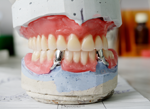
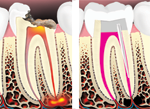
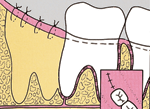


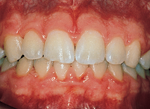
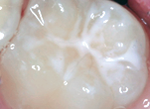

Baby Teeth
A child’s primary teeth, sometimes called “baby teeth,” are as important as the permanent adult teeth. The ADA recommends that a dentist examine a child within six months after the first tooth comes in and no later than the first birthday. Read on…
Sensitive Teeth
| Is the taste of ice cream or a sip of hot coffee sometimes a painful experience for you? Does brushing or flossing make you wince occasionally? If so, you may have sensitive teeth. Read on… |
Dentures
| If you’ve lost all of your natural teeth, whether from gum disease, tooth decay or injury, replacing missing teeth will benefit your appearance and your health. Dentures make it easier to eat and speak. Read on… |
Root Canal
Most of the time, a root canal is a relatively simple procedure with little or no discomfort involving one to three visits. Best of all, it can save your tooth and your smile. Read on…
Wisdom Teeth
| Wisdom teeth, also referred to as third molars, get their name by being the last teeth to come in during young adulthood. Your dentist or specialist may recommend removal to prevent problems or for others reasons. Read on… |
Thumbsucking
Thumbsucking is a natural reflex for children. It may make babies feel secure and happy and help them learn about their world. However, after the permanent teeth come in, sucking may cause problems. Read on…
Baby Bottle Tooth Decay
| Tooth decay in infants and toddlers is often referred to as Baby Bottle Tooth Decay. Tooth decay can occur when the baby is put to bed with a bottle, or when a bottle is used as a pacifier for a fussy baby. Read on… |
Gum Disease
| Gum disease is caused by plaque, the sticky film of bacteria that is constantly forming on our teeth. It is an infection of the tissues that surround and support your teeth, and is a major cause of tooth loss in adults. Read on… |
Dental Sealants
Sealants a plastic material usually applied to the chewing surfaces of the back teeth (premolars and molars) where decay occurs most often. They act as a barrier to prevent cavities. Read on…
Antibiotic Prophylaxis or Premedication
For some people, the use of preventive antibiotics before certain dental procedures, including teeth cleaning and extractions, is recommended if they have specific heart problems. Check with your cardiologist if you’re not sure whether or not you fall into one of these categories. Read more…

